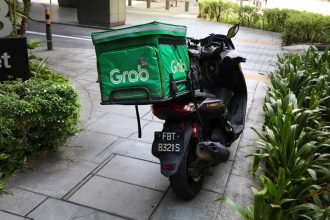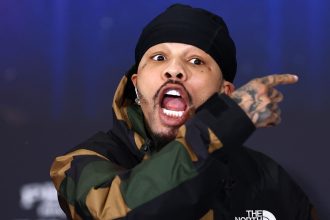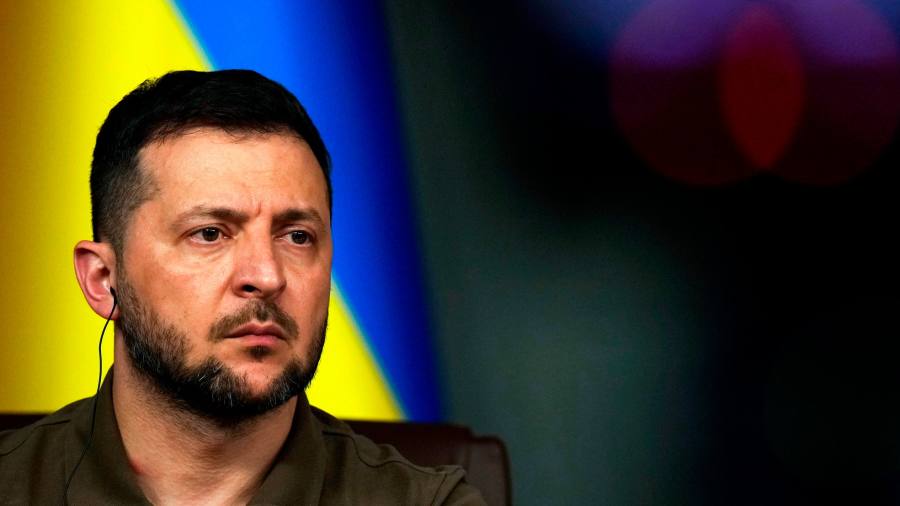Receive free Nato updates
We’ll send you a myFT Daily Digest email rounding up the latest Nato news every morning.
Nato leaders have declared they are prepared for Ukraine to ultimately join the military alliance, in a carefully hedged statement that drew immediate condemnation from Kyiv for its lack of a firm timeframe.
A summit communiqué agreed on Tuesday pledges to “extend an invitation” to Ukraine to join the alliance when “allies agree and conditions are met”.
Jens Stoltenberg, secretary-general, said the commitment would streamline the accession process and make Ukraine’s membership dependent simply on a political decision. “This will change Ukraine’s membership path from a two-step process to a one-step process,” he said.
But Ukraine’s president Volodymyr Zelenskyy immediately hit out at the 31-member alliance for negotiating the text without Kyiv at the table.
“It seems there is no readiness neither to invite Ukraine to Nato nor to make it a member of the alliance . . . For Russia, this means motivation to continue its terror,” he said, ahead of arriving at the summit in Vilnius, Lithuania.
Separately, the G7 group of industrialised countries continued negotiations on an overarching package to support Ukraine “as long as it takes”, which they hope to announce as soon as the Nato summit is over.
The summit has been dominated by how to respond to Russia’s full-scale invasion of Ukraine. The communiqué states that Kyiv’s “future is in Nato” but provides no timeline for its accession.
US president Joe Biden signalled Washington’s support for the compromise text, speaking beside Stoltenberg. “We agree on the language that we proposed and you proposed relative to the future of Ukraine being able to join Nato,” Biden said.
But Zelenskyy said it was “unprecedented and absurd when [a] timeframe is not set, neither for the invitation nor for Ukraine’s membership”, and also attacked Nato’s “vague conditions” for inviting Kyiv.
The compromise over the text had aimed to show Ukraine’s membership would be a potentially fast-tracked political decision that would bypass Nato’s formal accession process while nodding to US and German concerns about appearing to lower the bar for entry.
The issue of how to acknowledge Ukraine’s membership ambitions as it defends itself against Russian aggression has exposed divisions within Nato in weeks of intense negotiations, with the US and Germany wary of implying that Kyiv’s membership is inevitable without conditions attached.
On the other side, mainly eastern European members, with the backing of France and the UK, had called for the word “invitation” to be included in the statement and for an acknowledgment that it would be a political, not technical decision to invite Ukraine to join.
UK prime minister Rishi Sunak told reporters on Tuesday: “Ukraine’s rightful place is in Nato.” He added: “What’s important at this summit is that commitment is reaffirmed and that there is demonstrable progress towards that goal and I think that’s what you will see.”
Dmitry Peskov, Russian president Vladimir Putin’s spokesperson, told reporters that any move to speed up Ukraine’s admission into Nato would be “potentially very dangerous for European security”, according to Interfax.
“This carries a lot of risks and the people who will make this decision should admit that,” he said.
The summit communiqué also states that allies “recognise that Ukraine’s path to full Euro-Atlantic integration” has moved “beyond the need for the membership action plan”, referring to Nato’s formal accession process. It also notes that Kyiv has “made substantial progress” on reforms.
Nato agreed in 2008 that Ukraine “will become” a member, but provided no timeline or accession process.
All member states agree that Ukraine cannot join the alliance while the war is continuing, given that would trigger Nato’s Article 5 mutual defence clause and bring all members into the conflict.
Western diplomats said the G7 was separately preparing to announce its own multilateral security agreement for Ukraine on Wednesday following the Nato summit.
The arrangement would allow individual countries from inside and outside the G7 to structure bilateral military and financial pledges of support.
It would seek to ensure Kyiv can continue repelling Russia’s invasion, rebuild its armed forces and economy after the war ends and help it meet the Nato standards required for its eventual membership of the alliance.
The agreement is still being negotiated, with input from Ukraine, and the planned timeline could be delayed, the diplomats added.
Nato is also discussing weapons provision to Kyiv as it seeks to push forward its counteroffensive against Russia.
France said on Tuesday it would send its long-range Scalp cruise missiles to Ukraine to help it defend its territory against Russia. The missiles are the same as the Storm Shadow model already provided by the UK.
Germany is also to offer a €700mn package of weapons, Chancellor Olaf Scholz announced at the summit. The package would include 40 Marder infantry fighting vehicles, 25 Leopard 1A5 main battle tanks and five armoured recovery vehicles from industry stocks as well as launch vehicles for Patriot air defence systems.
The defence ministers of Denmark and the Netherlands said a coalition of 11 western countries would begin training Ukrainian pilots in US-made F16 fighter jets next month.
The training will begin in Denmark and a dedicated training centre will be formed in Romania for long-term training, the ministers said.
Western states have said such training must take place before any potential donation of the jets to Ukraine, which would require US approval.
Additional reporting by Anna Gross and Guy Chazan
Read the full article here





